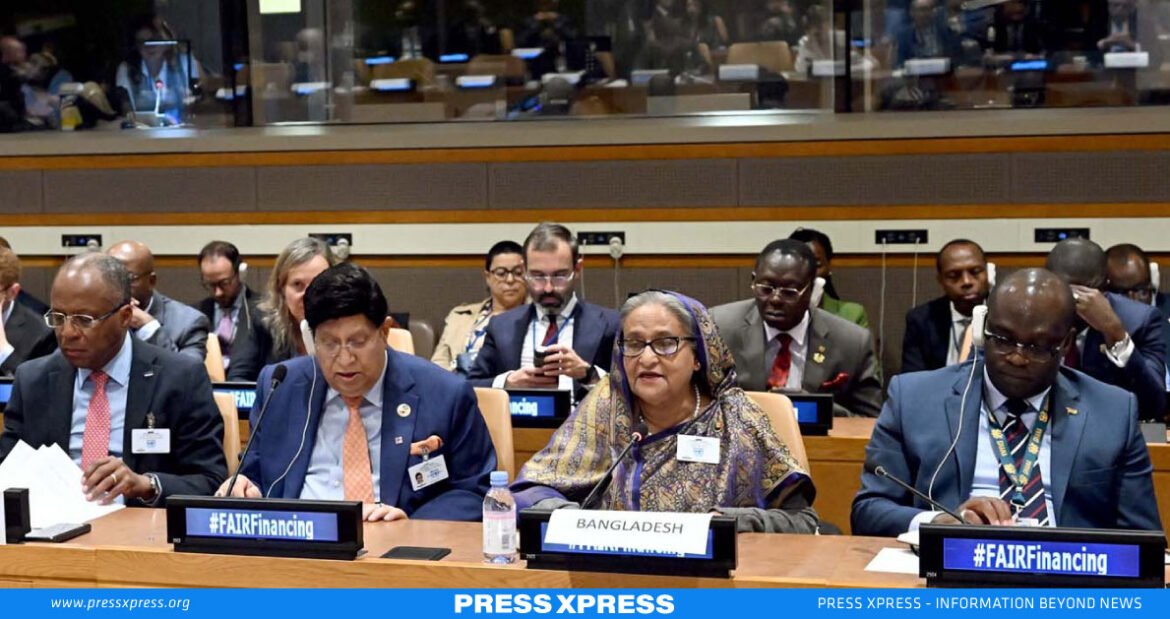It emphasizes the need for inclusivity, transparency, and flexibility in financial mechanisms to ensure a fair and sustainable global economic order.
In a high-level roundtable discussion titled “Towards a Fair International Financial Architecture” held at the United Nations Headquarters in New York on September 19, 2023, which convened by Spain and the European Council on the sidelines of the 78th UNGA session. Prime Minister Sheikh Hasina addressed the pressing need for a fundamental shift in the global financial system to address the ongoing financial crisis.
The Prime Minister advocated for a reevaluation of the global credit rating system due to its limitations in providing financial access to numerous low and middle-income nations.
You can also read: Sheikh Hasina’s Vision for Empowering Women
“We concur with the UN Secretary-General’s assertion that a comprehensive reassessment of the global credit rating system is imperative. The present rating framework continues to impede financial accessibility for a significant number of low- and middle-income countries,” he emphasized.
During her speech, she presented five crucial points to reshape the financial system. Let’s delve into these points and their significance.
Realign Priorities for Sustainable Development and Climate Action
Prime Minister Sheikh Hasina emphasized the necessity for Multilateral Development Banks (MDBs), International Financial Institutions (IFIs), and private lending agencies to realign their priorities. They should mobilize additional funds to support the implementation of Sustainable Development Goals (SDGs) and climate action initiatives.
This point underscores the importance of redirecting financial resources toward critical global challenges, such as climate change and poverty eradication.
Accessible and Affordable Funds for Developing Countries
Sheikh Hasina stressed the importance of making funds readily available to developing countries at low-cost and concessional rates. Preferably, these funds should be provided in the form of grants rather than loans.
This point addresses the financial burden faced by developing nations and aims to ensure they have access to the necessary resources for their development.

Incorporate Disaster Clauses in Lending Instruments
The Prime Minister proposed that all lending instruments should include disaster clauses. These clauses would enable vulnerable countries to absorb economic shocks during crises, like natural disasters or pandemics.
This idea promotes resilience in the face of unforeseen challenges and helps prevent financial crises from deepening.
Prioritize Fair and Transparent Debt Relief Measures
Sheikh Hasina called for a prioritization of fair and effective debt relief measures. This prioritization should be based on coordination and transparency among creditors.
Prime Minister said, “We try to stay clear of high-interest-rate loans to avoid debt distress. Bangladesh has never defaulted on its loan repayment, and we hope to maintain that record.”
This point acknowledges the debt burdens carried by many nations and the need for a coordinated approach to debt relief, ensuring it benefits the most vulnerable.
SDR Borrowing Limits Based on Needs and Vulnerability
Instead of fixed quotas, Sheikh Hasina suggested that Special Drawing Rights (SDR) borrowing limits should be determined by the specific needs and vulnerability of countries. Additionally, these limits should be supported by streamlined lending processes.
This proposal aims to make SDRs more responsive to the unique circumstances of each country, facilitating equitable access to financial resources.
Prime Minister Hasina’s comprehensive plan emphasizes the urgency of reforming the international financial architecture to address the current crisis effectively. She highlighted that while there is recognition of the need for reforms, there remains a lack of consensus on their nature and extent, emphasizing the importance of political will.
Sheikh Hasina also acknowledged the challenges faced by Bangladesh in managing its finances. Despite the economic strains caused by the COVID-19 pandemic and the Ukraine war, the country has maintained a GDP growth rate of 6-7%. However, it is crucial to manage inflation, balance payments, and sustain development expenditures.
Furthermore, she emphasized Bangladesh’s success in poverty reduction, citing a decrease from 41.9% to 18.7% in overall poverty and a reduction from 25.5% to 5.6% in extreme poverty. These achievements underscore the nation’s commitment to economic development and social progress.
In conclusion, Prime Minister Hasina’s five-point plan to reshape the global financial system addresses critical issues facing the international community. It emphasizes the need for inclusivity, transparency, and flexibility in financial mechanisms to ensure a fair and sustainable global economic order. Her vision advocates for a more equitable distribution of resources, particularly for developing nations, and aligns with the broader goals of achieving sustainable development and combating climate change. It is an essential contribution to the ongoing global conversation about reforming the international financial architecture.


